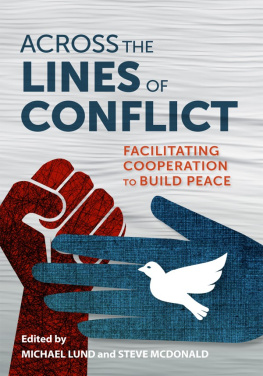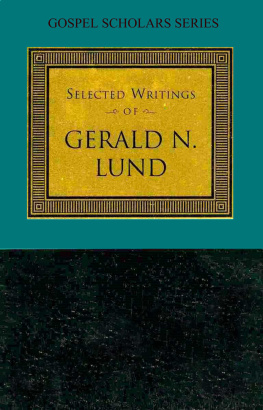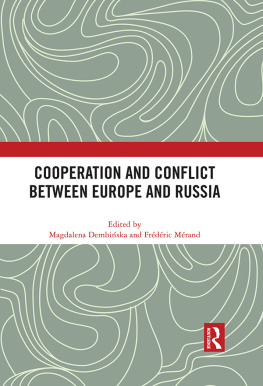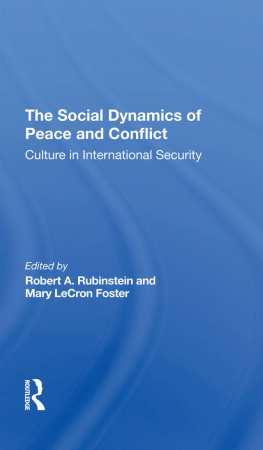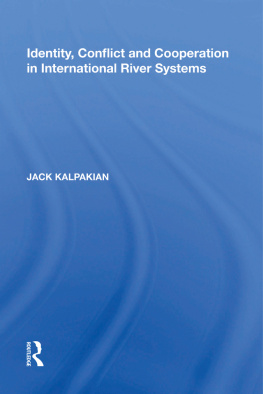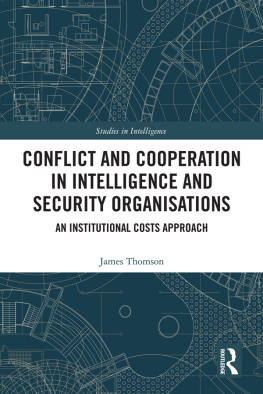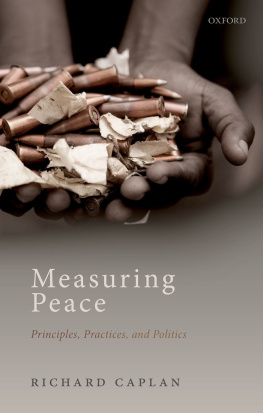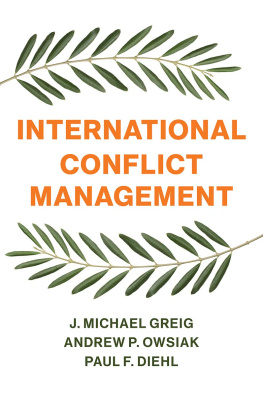Woodrow Wilson Center Press
Washington, D.C.
www.wilsoncenter.org
Columbia University Press
Publishers Since 1893
New York Chichester, West Sussex
cup.columbia.edu
Copyright 2015 Woodrow Wilson International Center for Scholars
All rights reserved
E-ISBN 978-0-231-80137-9
Library of Congress Cataloging-in-Publication Data
Across the lines of conflict : facilitating cooperation to build peace /
edited by Michael Lund and Steve McDonald.
pages cm
Includes index.
ISBN 978-0-231-70450-2 (hardcover : alk. paper) ISBN 978-0-231-80137-9 (ebook)
1. Peace-buildingCase studies. 2. Conflict managementCase studies.
3. ReconciliationCase studies. I. Lund, Michael S., 1941 editor.
II. McDonald, Steve, 1945 editor.
JZ5538.A27 2015
303.66dc23
2015031983
Printed in the United States of America.
A Columbia University Press E-book.
CUP would be pleased to hear about your reading experience with this e-book at .
Cover design: Naylor Design, Inc.
References to websites (URLs) were accurate at the time of writing. Neither the authors nor Woodrow Wilson Center Press and Columbia University Press are responsible for URLs that may have expired or changed since the manuscript was printed.

The Wilson Center, chartered by Congress as the official memorial to President Woodrow Wilson, is the nations key nonpartisan policy forum for tackling global issues through independent research and open dialogue to inform actionable ideas for Congress, the Administration, and the broader policy community.
Conclusions or opinions expressed in Center publications and programs are those of the authors and speakers and do not necessarily reflect the views of the Center staff, fellows, trustees, advisory groups, or any individuals or organizations that provide financial support to the Center.
Please visit us online at www.wilsoncenter.org.
Jane Harman, Director, President, and CEO
Board of Trustees
Thomas R. Nides, Chair
Public members: William Adams, Chairman of the National Endowment for the Humanities; James H. Billington, Librarian of Congress; Sylvia Mathews Burwell, Secretary of Health and Human Services; Arne Duncan, Secretary of Education; David Ferriero, Archivist of the United States; John F. Kerry, Secretary of State; David J. Skorton, Secretary of the Smithsonian Institution. Designated appointee of the president from within the federal government: Fred P. Hochberg, Chairman and President, Export-Import Bank of the United States
Private citizen members: Peter Beshar, John T. Casteen III, Thelma Duggin, Lt. Gen. Susan Helms, USAF (Ret.), Barry S. Jackson, Nathalie Rayes, Earl W. Stafford, Jane Watson Stetson
Wilson National Cabinet
Ambassador Joseph B. Gildenhorn & Alma Gildenhorn, Co-Chairs
Eddie & Sylvia Brown, Melva Bucksbaum & Raymond Learsy, Paul & Rose Carter, Armeane & Mary Choksi, Ambassadors Sue & Chuck Cobb, Lester Crown, Thelma Duggin, Judi Flom, Sander R. Gerber, Harman Family Foundation, Susan Hutchison, Frank F. Islam, Willem Kooyker, Linda B. & Tobia G. Mercuro, Dr. Alexander V. Mirtchev, Thomas R. Nides, Nathalie Rayes, Wayne Rogers, B. Francis Saul II, Ginny & L. E. Simmons, Diana Davis Spencer, Jane Watson Stetson, Leo Zickler
Dedicated to Howard Wolpe, a champion of peace in Africa.
This book is a publication of the Working Group on Preventing and Rebuilding Failed States, a project created by former congressman Howard Wolpe at the Woodrow Wilson International Center for Scholars, and is dedicated to Howards memory. Edited by Michael Lund and Steve McDonald, it brings together the presentations given to the various sessions of the working group and weaves them into a broader narrative on the kinds of international interventions that can occur and how they can best play out. Taking a holistic approach to the various stages of conflict and postconflict interventions, it studies episodes in Estonia, Guyana, Tajikistan, Sri Lanka, Cyprus, and Burundi in chapters by expert authors. Introductory and concluding chapters by Michael Lund set out the context and conceptual framework around unofficial peace processes, the lessons learned, and ways in which the international community can better approach conflict resolution.
I knew Howard for the entire time he was on the national stage as a member of Congress, later as a Special Envoy for President Bill Clinton, and then as the director of the Africa Program and the Project on Leadership and Building State Capacity at the Wilson Center. When he first came to the House of Representatives as a liberal Democrat representing District 3 in southwestern Michigan in January 1979, I had been in Congress for fourteen years. Howards tenure on the House Foreign Affairs Committee, and unprecedented ten years as the chair of the Africa Subcommittee from 1982 to 1992, also coincided with my time on the Foreign Affairs Committee from 1973 until I left Congress in 1999. Needless to say, we worked closely together on issues relating to policy and his abiding interest in, knowledge about, and love for the African continent. Congress had never before had a chair of the Africa Subcommittee so steeped in the history and culture of the continent. His doctoral dissertation at the Massachusetts Institute of Technology was on Ibo politics in Nigeria, where he had lived for two years in the city of Port Harcourt. He had actively sought the chairmanship of the subcommittee because of his background, and he held that position longer than any other chair had done before or has since.
Our partnership and close relationship in the House and on the Foreign Affairs Committee led to us reuniting in 2001. Howard had then just finished serving four years as Special Envoy to the volatile Great Lakes Region of Africa, following his appointment to that position in 1996 by President Clinton. The Wilson Center, where I served as president and CEO from 1999 to 2010, had offered Howard a Public Policy Scholar position in 2001, which he accepted. The next year, he came to see me and discuss a rather unique project he had been working on, and see if the Center would be interested in housing it. In his years as special envoy, Howard had been the primary American negotiator on the peace processes in Burundi and the Democratic Republic of Congo (DRC), ending long years of civil war in both countries that had taken hundreds of thousands of lives. Howard was very concerned that the peace accord in Burundi was fraying, with rebel groups returning to the battlefield to challenge the sitting government. He felt strongly that Burundians, both in the leadership of all parties and factions and among the public at large, were at a point of exhaustion and desperation and dearly wanted to avoid returning to a war footing. At the same time, Burundians feared each other, saw each other as untrustworthy enemies, and believed that the only way to protect their own interests was to exclude others from any role in governance. Howards experience in building reconciliation and trust in divided communities and institutions during the US civil rights struggle suggested to him that in Burundi, before elections could be held and democratic government put in place, a similar reconciliation and trust-building exercise should be held among the leaders of all parties, including all ethnic, regional, economic, and social/cultural groups. He felt that the only way to ensure a stable, enduring peace and a return to responsible and democratic government was to create trust and communication among the key players and build their negotiation, communication, and joint problem-solving skills.


